Occupy Central
Occupy
Central is a civil disobedience movement which began in Hong Kong on September
28, 2014. It calls on thousands of protesters to block roads and paralyse Hong
Kong's financial district if the Beijing and Hong Kong governments do not agree
to implement universal suffrage for the chief executive election in 2017 and
the Legislative Council elections in 2020 according to "international
standards." The movement was initiated by Benny Tai Yiu-ting (戴耀廷), an
associate professor of law at the University of Hong Kong, in January 2013.
OCCUPY CENTRAL - DAY 49: Full coverage of the day’s events
Occupy student leaders' Beijing trip on track - without Rita Fan's help
Trio of protesters will probably be rejected at the door before they get to meet any state leader
PUBLISHED : Saturday, 15 November, 2014, 4:10am
Rita Fan accused the protesting students of deliberate violation of the law and disruption to life in the city. Photo: Sam Tsang
Student leaders of the Occupy Central movement will take their democracy demands to the capital this afternoon, even though they failed to get help from Hong Kong's sole representative in the top legislature, Rita Fan Hsu Lai-tai, to set up talks with state leaders.
But the trio are likely to be given the cold shoulder. A source close to Occupy organisers cited a middleman who had once facilitated dialogue with the government as saying Beijing would not let them enter the capital.
It is understood that the central government will repatriate Federation of Students representatives Alex Chow Yong-kang, Eason Chung Yiu-wa and Nathan Law Kwun-chung right away rather than detain them.
That would dash their hopes of meeting Premier Li Keqiang , officials and delegates to the National People's Congress to lodge a "political protest" against its restrictive framework for the 2017 chief executive poll.
Last night, Fan, a member of the NPC Standing Committee, accused the protesting students of deliberate violation of the law and disruption to life in the city.
"If I helped you arrange a meeting with central government officials, how could I face the Hongkongers who have been abiding by the law and hoping for a return to normality?" she asked. "I sincerely hope all of you will mend your ways and become pillars of … society. Don't waste your time [occupying] streets!"
Fan reiterated she would not accept students' demand for the Standing Committee to retract its August 31 decision that ruled out public nomination of candidates for the poll and required hopefuls to get majority support from a nominating committee.
But Chow said they would still go to Beijing, despite Fan's remarks. "Fan said the [Standing Committee] framework was reasonable … I wondered if she was blind to what's been happening with the 'umbrella movement'."
He believed it was unlikely they would be arrested by mainland authorities. He said they planned to take a banner with the slogan "I want genuine universal suffrage", and their accommodation in Beijing had been booked.
However, politicians - including a former student leader who staged a protest in Guangzhou years ago - were pessimistic about the Beijing mission.
Democratic Party vice-chairman Richard Tsoi Yiu-cheong was among seven federation representatives who were warmly received in 1988 by Lu Ping , deputy secretary general of the Basic Law drafting committee. He said the political climate had changed since the 1989 Tiananmen Square crackdown. "Unless it's arranged in advance, Beijing will see [this] as confrontation."
Executive councillor Bernard Chan urged the trio to stay in Hong Kong and end the occupation instead. "Their messages have been loud and clear in Hong Kong and even on the mainland."
But there is some hope. Three federation representatives were received by officials of the Standing Committee's complaint letter and request handling office when they petitioned against Beijing's Basic Law interpretation in 1999.
This article appeared in the South China Morning Post print edition as Beijing trip on track - without help from Fan
Demands for political change need to be realistic and attainable
PUBLISHED : Saturday, 15 November, 2014, 4:53am
People walk past a cardboard cutout of Chinese President Xi Jinping holding an umbrella as it stands among tents outside the Central Government Offices in Admiralty.
While many in Hong Kong consider the chief executive election proposals from Beijing to be unacceptable and demands for genuine democracy are ongoing, there is no clear definition of what is meant by genuine or of the day-to-day benefits that we might enjoy when it is obtained.
The demands of the Occupy protesters appear to lack focus. Some are specific issues relating to the nomination of chief executive candidates while others are about more general livelihood issues which the previous administration sadly neglected.
Protesters seem to be channelling the frustration of many who feel isolated from and ignored by the government (political appointees and senior officials) and by big business, which is perceived to be greedy and uncaring.
The Basic Law, while less than ideal, exists, and it appears there is very little, if anything, that the Hong Kong government can do to amend it. Surely then, it is now essential to focus on what is possible.
We need to agree on an improved, and if possible enlarged, composition of the nomination committee so that it reflects the community balance of today, not 30 years ago.
The Basic Law states that a fully directly elected Legco is the ultimate objective, so functional constituencies will eventually disappear. If this is not possible yet, we at least need to ensure that members of the nomination committee are elected (not selected) by individuals, not companies.
There is room to do this, even within the rather restrictive framework.
We need to agree on a practical and transparent mechanism whereby committee members can officially be made aware of interested chief executive candidates and to decide on the minimum number of members that need to confirm their support before a particular name is included on the nomination list to secure the required 50 per cent of votes.
We also need to ensure the system does not make it difficult for three candidates rather than two to be nominated, and secure official assurance that further improvements of the overall election system will be considered.
Such decisions, I believe, can be made by Hong Kong people in Hong Kong but will require all parties to work together - in fact, to practise democracy.
However, even if this can be achieved, it is only a start - we also need a marked change in mindset to resolve the livelihood issues which have been ignored for too long.
Margaret Brooke, Wan Chai
This article appeared in the South China Morning Post print edition as Demands for political change need to be realistic and attainable
Students’ trip to Beijing ‘unnecessary’, says Chief Secretary Carrie Lam
PUBLISHED : Saturday, 15 November, 2014, 3:08pm
Lam said any cross-border trip would have to be in compliance with immigration policies in Hong Kong and on the mainland. Photo: Nora Tam
There is no need for student leaders of the Occupy Central movement to take their democracy demands to Beijing on Saturday, according to Chief Secretary Carrie Lam Cheng Yuet-ngor.
The central government is well aware of the different opinion of Hongkongers and has made decisions accordingly, Lam said on Saturday morning.
The Federation of Students representatives were planning to go to the capital in an attempt to meet state leaders to express their demands for genuine universal suffrage. However, Lam said the demand had already been reflected in a report submitted to Beijing by Chief Executive Leung Chun-ying.
“The report pointed out with faith that there are different opinions about the nomination process of the chief executive. That included civil nomination proposed by the Federation of Students,” she said.
The Standing Committee of the National People’s Congress made its decision about Hong Kong’s 2017 chief executive election on August 31 after a comprehensive review, Lam said.
“If the Federation of Students is going to express such views, it seems [their trip] isn’t a big necessity,” she added.
While the student leaders were not sure if they would be allowed entry into the mainland, Lam refused to speculate, saying any cross-border trip would have to be in compliance with immigration policies in Hong Kong and on the mainland.
Federation secretary general Alex Chow Yong-kang had said the trip was a “political protest” after several people, including Hong Kong’s sole representative in the top legislature, Rita Fan Hsu Lai-tai, had refused to line-up talks for them with leaders in Beijing.
Chow, Eason Chung Yiu-wa and Nathan Law Kwun-chung hoped to meet Premier Li Keqiang, and officials and delegates to the national legislature, which is behind the reform ruling.
Civic Party lawmaker Alan Leong Kah-kit said the worst scenario would be seeing the students detained after being admitted into the mainland. However, the students were most likely to be refused boarding passes at the airport, he said.
The state-run newspaper Global Times voiced support for the authorities to refuse entry to the students in an editorial on Saturday.
“The HKFS activists are clear that their plan is just a show. They know they might not be able to enter Beijing, or if they do enter, they are unlikely to meet the state leaders,” it wrote.
“But they continue the show just to create an atmosphere of martyrdom. If the three activists were arrested by authorities in Beijing, it could be a successful climax to the show – there might be a sympathetic outpour in Hong Kong if that would happen.”
Occupy student leaders seeking to travel to Beijing denied boarding at airport
Federation representatives demand to know why their travel documents were invalidated even before they boarded flight to the capital
PUBLISHED : Saturday, 15 November, 2014, 5:57pm
Nathan Law, Alex Chow and Eason Chung at Hong Kong airport after being banned from flying. Photo: Jonathan Wong
Three student leaders at the heart of the Occupy Central protests are demanding the Hong Kong government explain why their travel documents were invalidated yesterday, hours before they were to fly to Beijing to press their demands for true universal suffrage.
It is extremely rare for authorities to revoke a Hongkonger's "home return permit" before they even reach the mainland. Local pro-democracy activists have in the past either had their entry denied without their travel permits affected, had their applications for renewal of the permits rejected, or had their permits confiscated on mainland soil.
The students and pan-democratic lawmakers said the decision was an "affront to the law" and a sign that Beijing would not listen to Hong Kong people's views.
This came as US President Barack Obama gave his strongest statement yet on the Occupy movement, saying that Hongkongers were demanding a universal, not Western, value.
The students said they were "shocked and angry" to discover that their travel documents had been invalidated. "Why is a great state like China afraid of just three students?" federation secretary general Alex Chow Yong-kang said. "We have not even stepped on mainland soil."
It is the first time Federation of Students representatives have had their entry permits terminated; three times in the past 26 years, delegations have been allowed to visit over sensitive issues.
Chow said he would demand an explanation from the Hong Kong government because it was only Cathay Pacific, the airline they were booked on, that told them their permits were revoked.
The Security Bureau did not comment. An Immigration Department spokeswoman said the Airport Authority was responsible for the area where the three were turned back. The authority said it did not have the power to turn back the students.
The students wanted to go to Beijing to seek meetings with state leaders including Premier Li Keqiang to express a demand for genuine universal suffrage for the 2017 chief executive election. They had three banners bearing slogans with Occupy protesters' signatures.
At about 3.50pm yesterday, Chow and federation members Nathan Law Kwun-chung and Eason Chung Yiu-wa were escorted by airport staff through a crew entrance to have their baggage scanned and documents checked. They were told that they should use the crew entrance because the departure hall was packed with their supporters.
But once inside, they were stopped by several police officers and Airport Authority staff and taken aside. After almost 30 minutes of questioning and waiting, Chow said they were told that they had to go back. A Cathay staff member told the students that the airline was "informed by relevant parties this morning" that their home return permits had been made void.
Former federation member Jeffrey Tsang, who planned to take the same flight to help the trio with accommodation and transport, was also informed by Cathay that his travel permit had been invalidated.
The decision was "an affront to the rule of law" and "arbitrary use of power", said Alan Leong Kah-kit, convenor of a weekly meeting of 23 pan-democratic lawmakers. He said he saw no point in the Hong Kong government starting the next round of public consultation on political reform as Beijing had stopped listening to the people.
But Regina Ip Lau Suk-yee, a lawmaker and former security minister, said mainland authorities had the right to revoke the travel documents of suspected terrorists, criminals or troublemakers.
"The students are just staging a show. Their attitude is poor," Ip said. She said the trio's case could be compared to that of whistle-blower Edward Snowden, as the British government told airlines around the world not to allow him on board flights to the UK after the US government alleged he had leaked state secrets.
Ip's comment echoed that of the Global Times, a state-run tabloid, which said in an editorial yesterday that the students' plan was "a show just to create an atmosphere of martyrdom".
Meanwhile, Obama had words of support for the protesters who have occupied sites in Admiralty, Mong Kok and Causeway Bay for seven weeks. "Today, people in Hong Kong are speaking out for their universal rights," Obama said in a speech in Australia, where he was attending the G20 summit.
"When we speak out on these issues, we're told that democracy is just a Western value; I fundamentally disagree with that."
In response, the Chief Executive's Office reiterated that the government hoped foreign governments and legislatures would "respect" the principle that constitutional development was an "internal affair" of Hong Kong.
Meanwhile, Markus Ederer, state secretary of Germany's Federal Foreign Office, told a law conference at the Chinese University of Hong Kong that people should "recognise and accept the legal and political limits", respect the rule of law and make compromises on political reform.
He said he had met local officials and Beijing's representatives on Friday.
This article appeared in the South China Morning Post print edition as Beijing bans student leaders' mainland trip
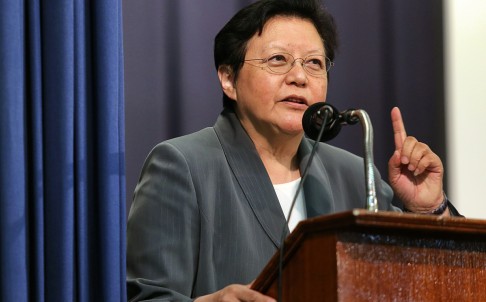
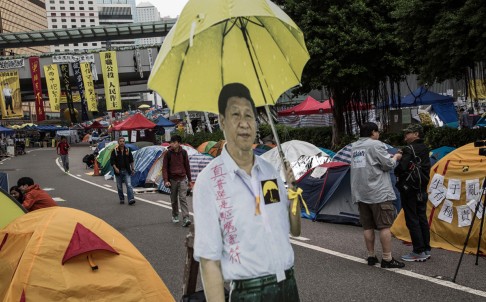
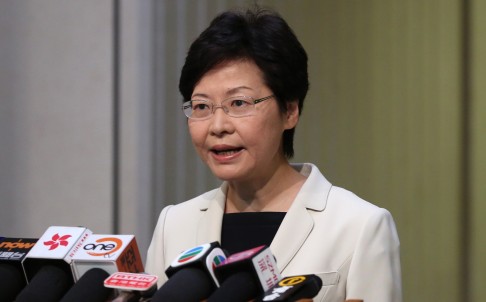
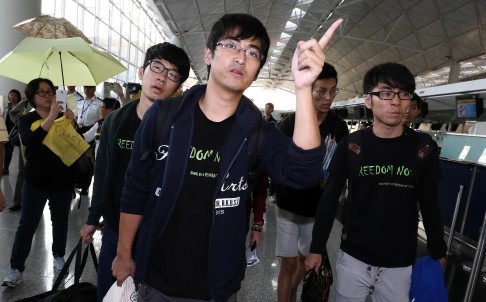
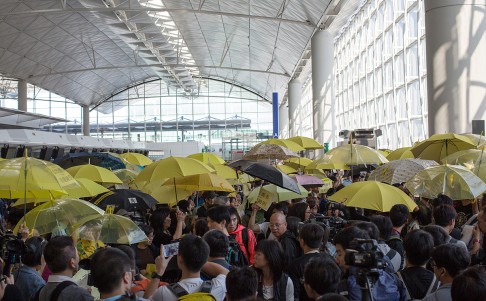
沒有留言:
張貼留言